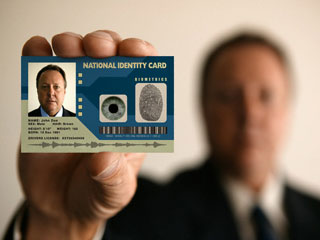The Real ID ActBy Jamie ColbyFOX Fan Feb. 03, 2007 |
Popular 
Claim Jewish Student Was 'Stabbed In The Eye' by Pro-Palestine Protester Draws Mockery After Video Released

Mistrial Declared in Case of Arizona Rancher Accused of Killing Migrant Trespasser

Sen. Hawley: Send National Guard to Crush Pro-Palestine Protests Like 'Eisenhower Sent the 101st to Little Rock'

Senate Passes $95B Giveaway to Israel, Ukraine, and Taiwan, Combined With TikTok Ban

AP: 'Israeli Strikes on Gaza City of Rafah Kill 22, Mostly Children, as U.S. Advances Aid Package'
  Been to the DMV lately? That’s your local Department of Motor Vehicles. Maybe you avoided it all together by applying on-line or by mail. But chances are you faced long lines and delays. Well, you might look back on the experience next year and think it was a breeze compared to what the federally mandated Real ID Act will require you to do. Let me explain. Been to the DMV lately? That’s your local Department of Motor Vehicles. Maybe you avoided it all together by applying on-line or by mail. But chances are you faced long lines and delays. Well, you might look back on the experience next year and think it was a breeze compared to what the federally mandated Real ID Act will require you to do. Let me explain.Back in 2005, Congress approved an $82 billion dollar spending bill that incorporated a description of a new security measure dealing with your drivers license. Under the measure, your new drivers’ license — the one you’ll be required to get starting in 2008 — will take a lot of work on your part. And, if you don’t get it done, you can forget about flying on an airplane, opening a bank account, collecting social security and for that matter taking advantage of many government services. You’ll have a heck of a time getting into a federal building too. The bill was designed to making us safer post-9/11. The hijackers used a loophole to obtain drivers’ licenses, which they then used to gain access through airport security onto airplanes. The best way to prevent that from happening, lawmakers determined, was to make anyone applying for a drivers’ license or a photo ID card prove not only who they are, but also that they are in the United States legally. Lead sponsor of the bill, Congressman James Sensenbrenner (R-Wis.) raises a point made in the 9/11 commission report — that travel documents are as important to terrorists as explosives. That, he says, is why Congress passed the Real ID Act. What does that mean for you and me? Well, for one thing we’ll no longer be able to apply for a drivers license or photo ID card renewal on-line or by mail. Everyone, even folks who have drivers’ licenses that aren’t expired (with some exceptions that fall under a grandfather clause), will have to make an appointment and head to the DMV in 2008. When you get there, you’ll need more than your smile for the cheesy photo too. Birth certificates, proof of address and citizenship, photo ID, and Social Security cards are just some of what you might be asked to present to the DMV clerk — the one probably not returning that smile — because they will be required to confirm each and every bit of that information before issuing you a new “Real ID”…a process that could take weeks. The Department of Homeland Security is in charge of the Real ID program — ensuring we all meet the new federal ID standards. To do so, each Real ID will be encoded on a strip in the back with a lot of our personal information. That is where the debate begins, and right now it’s hit about a dozen states hard. Maine, Montana, New Mexico, Vermont and a handful of other states are either passing resolutions or proposing them to reject federally required Real ID cards. That has legislators who proposed the measure speaking out — blaming those states for putting our safety in a precarious position. But the dissenting states say it’s too costly, and puts our privacy on the line. They argue that the bill turns DMV employees into de facto federal immigration and naturalization agents. I’ve never been to a bar that runs a scanner on a drivers’ license, but I’m told that when a bar does that, they can digitally store your personal information…much more detail than they need to determine if you are old enough to be in their establishment. At a minimum: name, birth date, sex, ID number, a digital photograph, address, will be included and “scannable” on Real ID cards. Homeland Security may also add additional requirements — such as a fingerprint or retinal scan — they won’t issue their specifications for the Real ID for several months. So what do you think? Good idea or disaster? Is it worth the money to implement and enforce? Are you willing to experience more inconvenience at the DMV? Or must our privacy be protected….at any price? |



